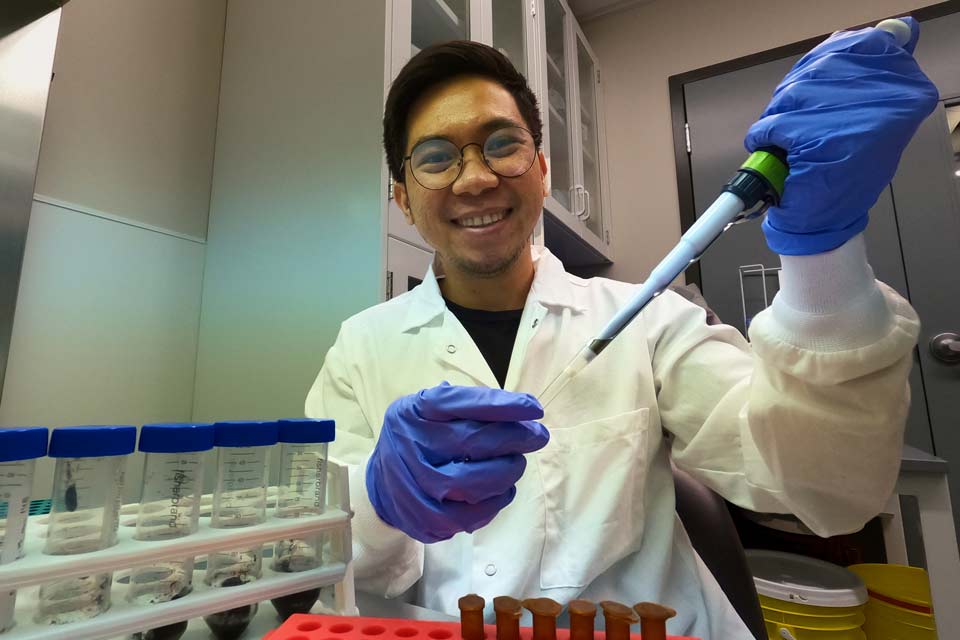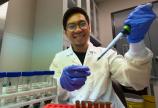Supporting Indigenous-led biodiversity monitoring
- Alf Wilson and Rachel Goldsworthy

Oil sands industrial activity, like any large-scale industrial development, modifies the ecology of the surrounding region. The people who live in those regions, and scientists around the world, want to know exactly what those changes are, in order to help support mitigation and minimization policies and responses.
UVic researcher Louie Lopez has been awarded a prestigious Liber Ero Post-Doctoral Fellowship to conduct Indigenous-led environmental DNA (eDNA) ecosystem monitoring with the Chipewyan Prairie Dene and Cold Lake First Nations. Their goal is to document long-term human-mediated ecosystem changes in lakes affected by oil sands industrial activity in northern Alberta.
I’m excited by the potential of combining Indigenous knowledge and ways of knowing with western science, like sedimentary eDNA, to provide a more comprehensive understanding of ecosystem changes. This project will provide eDNA-based monitoring tools and training, empowering the Indigenous partners to have timely and pertinent information on the impacts of oil sands activities within their territories.”
—Liber Ero post-doctoral fellow Louie Lopez
Liber Ero post-doctoral fellowships support exceptional early-career scientists to conduct and communicate research that informs applied conservation and management issues relevant to Canada. The two-year fellowship consists of a $70,000 per year stipend and a $15,000 annual travel and research budget.
“I am deeply invested in promoting equity in conservation science. We need to move ‘inclusion’ and ensure we provide a sense of belongingness when setting conservation priorities,” adds Lopez. “This project empowers and enables Indigenous communities to have their own environmental program for monitoring changes within their territories. In my little ways, I hope to contribute to providing a sense of belonging for everyone with a stake in environmental monitoring and conservation planning.”
Lopez works with UVic biochemist Caren Helbing, whose foundational work has transformed the use and uptake of eDNA testing. Helbing’s innovations and leadership have advanced eDNA into reliable use, analyzing long-term regional impacts on plants and animals—biodiversity changes.
The iTrackDNA program and Alberta Environment and Parks’ Oil Sands Monitoring workplan, in which Indigenous community-based monitoring projects are integrated with aquatic ecosystem health monitoring, are extensions of this work.
Sedimentary layers deposited and retained within lakes over many years trap eDNA from the organisms that lived there. This sedimentary DNA (sedDNA) provides an ongoing record across time, each layer going deeper into the past.
“SedDNA can help us reconstruct long-term ecosystem dynamics, bridging crucial information: gaps in the biodiversity historical record,” Lopez explains. “First Nations communities in the oil sands region hold detailed Indigenous knowledge about historical territorial land use and fisheries data that predate industrial oil sands activity. Bringing Indigenous knowledge together with western science, like sedDNA-inferred biodiversity, can help reveal long-term human-mediated ecosystem changes.”
Along with Lopez and Helbing, this collaboration includes Mark E. McMaster (Environment and Climate Change Canada), Paul Drevnick (Teck), Ave Dersch (Chipewyan Prairie Dene First Nation and Moccasin Flower Consulting), Chris Heavy Shield (Chipewyan Prairie Dene First Nation), Findlay MacDermid (Cold Lake First Nations), and Matt Lemay and Chris Hebda (Hakai Institute).
Lopez continues, “I am looking forward to working with a diverse group of mentors that include Indigenous members whose communities will directly benefit from this project.
Lopez and Helbing’s research reflects UVic’s ongoing commitment to the United Nations Sustainable Development Goals (UN SDGs) on clean water and sanitation (SDG 6), climate action (SDG 13), and life on land (SDG 15)—all areas where UVic is ranked as a global leader, among the top 25 universities around the world.

